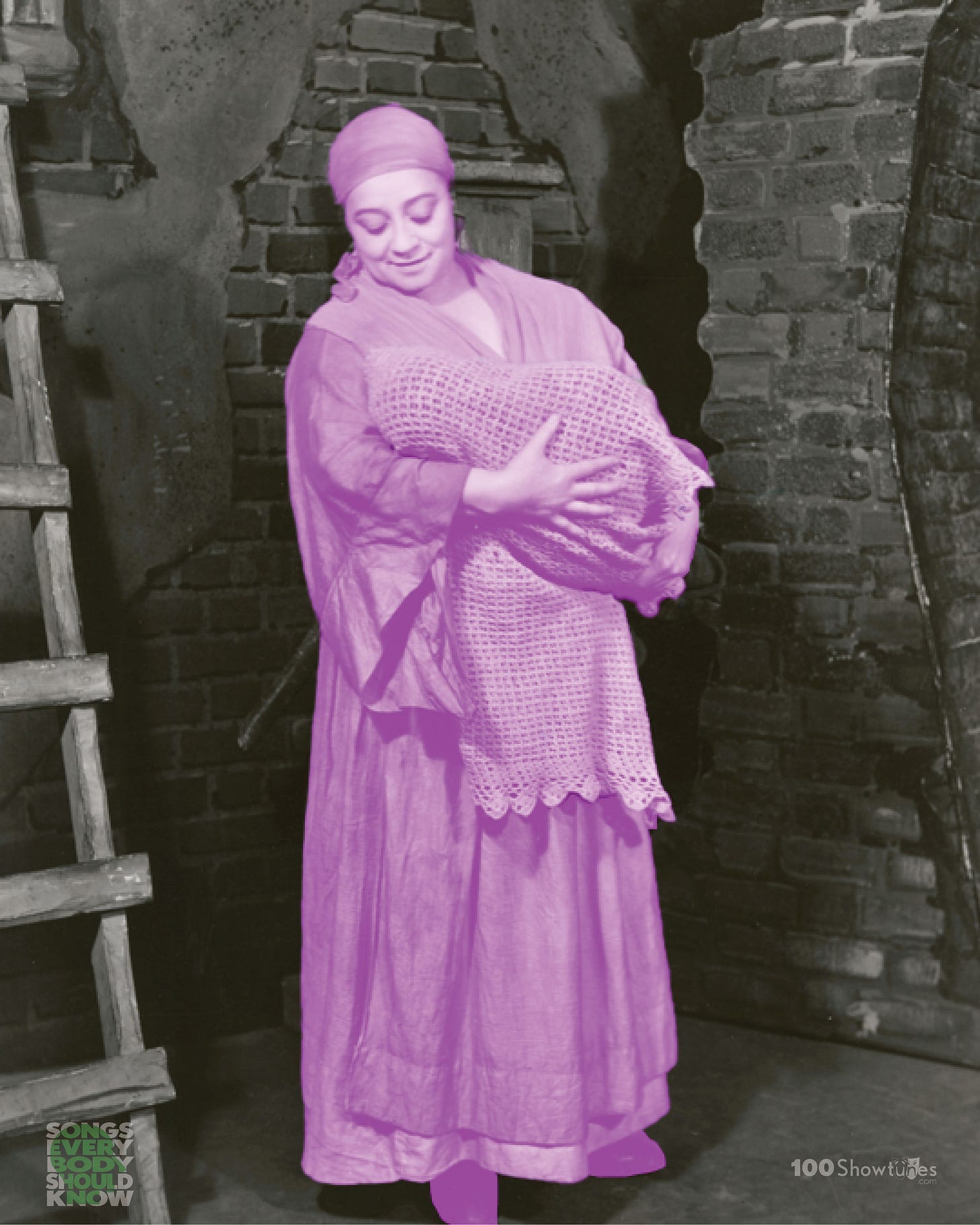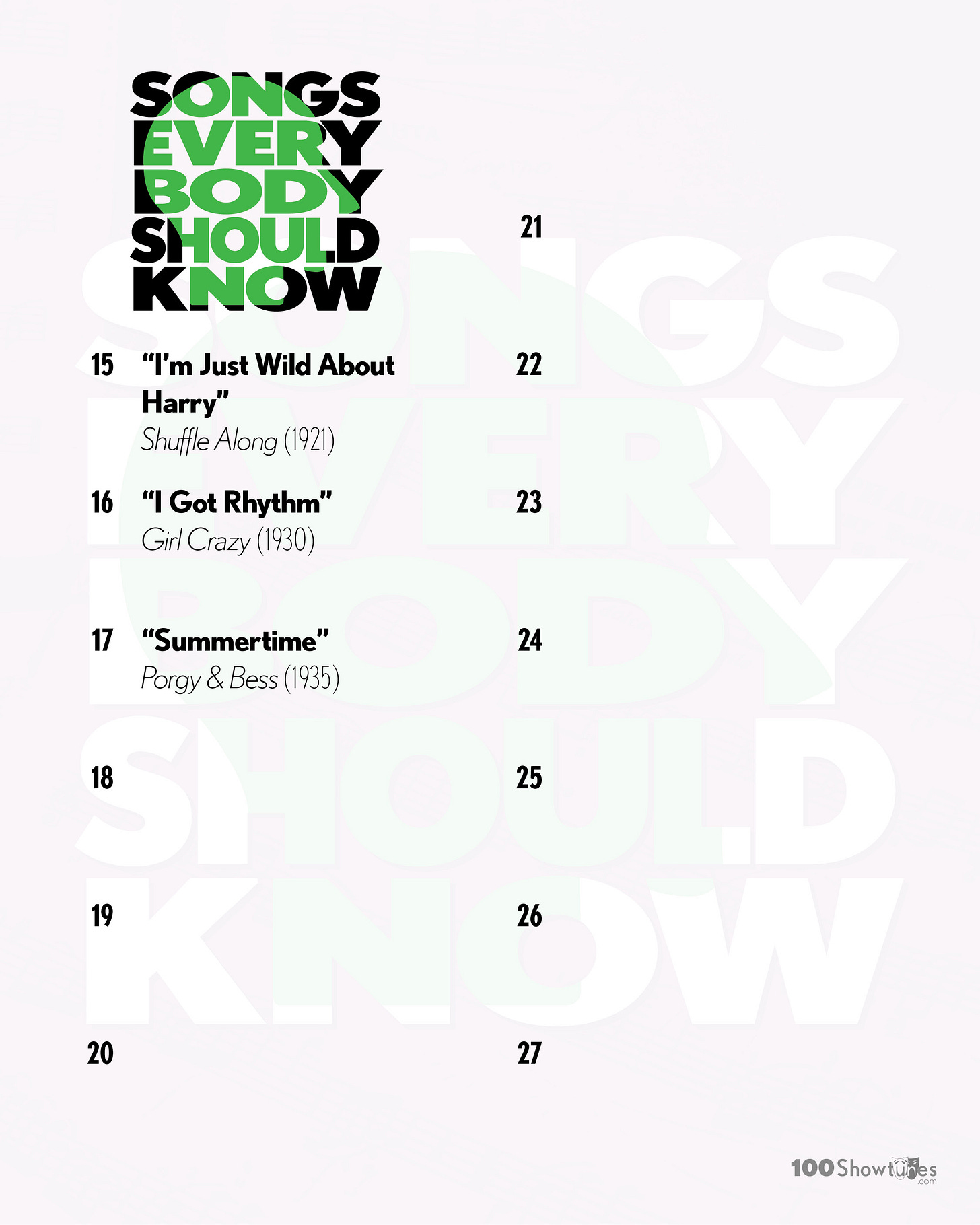No. 17. “Summertime”
PORGY AND BESS (1935). By George Gershwin (music), DuBose Heyward & Ira Gershwin (lyrics), and DuBose Heyward (book). Based on the play PORGY by DuBose and Dorothy Heyward
Late fall, 1935. You’re seeing a new kind of “folk opera” by George Gershwin—Porgy and Bess—featuring a cast almost entirely comprised of classically-trained Black singers. You had seen the play Porgy some years back and remember the basic gist of it: Porgy is a disabled beggar. Bess—the “happy dust”-addicted girlfriend of Crown, the local bully—is shunned by the local women but embraced by Porgy. The play featured a lot of folk music—what will the opera sound like? A brief overture starts to set the tone, but doesn’t give you a preview of any hits you’re about to hear. The curtain rises on “Catfish Row,” a costal tenement in South Carolina with its community of dock-workers and the women who take care of things on land. A piano player entertains everyone with a jazz solo before the attention shifts to a young mother, Clara, singing to her baby. The atmospheric lullaby, “Summertime,” has a seemingly optimistic lyric. But its melancholic melody hints that perhaps the livin’ is not, in fact, easy at all.
George Gershwin and DeBose Heyward’s “Summertime” is the most recorded song in history. It’s hard to find definitive or reliable data on this, but I’ve seen estimates that it’s been recorded between 25,000-65,000 times. (Those same sources compare that to 4,000 recordings of “Yesterday,” or 6,600 recordings of “Amazing Grace.”) Stephen Sondheim considers it one of the best lyrics in musical theater. And yet Porgy and Bess had a pretty rocky history throughout its first 40 years. Gershwin had “hoped to have developed something in American music that would appeal to the many rather than to the cultured few,” and while he succeeded with a few individual songs right out the gate, critics and audiences were initially split on the merits of a “folk opera” on Broadway. It was too formal for them wanting musical comedy and too common for them wanting high opera. And while the piece created an exceptionally rare opportunity for classically trained Black singers, the characterizations of Catfish Row’s denizens are based on stereotypes and written in faux dialect seen as dated and unflattering even by 1935 standards. But the enduring popularity of “Summertime” and other hits1 has inspired many decades of attempts to adapt Porgy… into something at least equal to the sum of its parts. Most Broadway revivals replaced the sung recitative with spoken dialogue with varying success, and without input from George Gershwin, who died in 1937 at the age of 38. Today, it’s understood as a musical masterpiece (if still somewhat dated dramatically).
Recommended Recording: ”Summertime,” Porgy and Bess (1977 Houston Grand Opera Cast)
40 years after its Broadway debut, Porgy was presented on Broadway by an American Opera Company for the first time. This production, directed by Jack O’Brien, restored Gershwin’s complete score—some of which had not been heard since before its Broadway premiere. (The original production cut about an hour of material between its out-of-town tryout and Broadway opening.) Many credit this production for changing perceptions about Porgy…. The grandeur of the music coupled with more modern acting sensibilities revealed a richer and more nuanced drama than people remembered. Presenting the show as the authors intended made the show better? What will they think of next!? This recording, produced by cast album guru Thomas Z. Shepard, is among the first recordings of the complete score. Note: as is often my experience with Shepherd recordings, the volume is really low, so be prepared to adjust the volume.
Alternate Performances
Porgy and Bess has been produced on Broadway 8 times and received ~49 cast recordings plus an equal or greater number of jazz interpretations. And that’s not counting the tens-of-thousands of “Summertime” recordings. The song has appeared in such varied movies and TV shows as There’s Something About Mary, Chocolat, Once Upon a Time in Hollywood, Stuck on You, The Sopranos, and 7th Heaven. The 1997 Sublime single, “Doin’ Time,” samples a bossa nova arrangement of “Summertime” recorded by jazz flautist Herbie Mann2. Cleveland Shoutout!: A year before the Houston Grand Opera recording, the Cleveland orchestra released a complete recording of the opera. Both the Cleveland and Houston performances won consecutive “Best Opera Recording” Grammys in 1976 and 1977!
1940 Cast Recording: This eight-song recording featured many members of the original Broadway cast (5 years after the production closed). The success of the recording led to a 1942 Broadway Revival with a new creative team. That production yielded a second album of selections which was soon combined with the 1940 recording to create what is dubbed the “Original Broadway Cast Recording.”
1959 Film: Reuben Mamoulian, who directed both the Porgy play and Porgy and Bess, was originally brought on board to direct a 1959 film, only to be fired and replaced by Otto Preminger. Many notable black actors had refused to participate in the movie because of concerns about the negative stereotypes. But they ended up with a pretty great cast, including Sidney Poitier (Porgy), Dorothy Daindridge (Bess), and Diahann Carroll (Clara). Spoken dialogue again replaced the recitative, and opera singers dubbed the vocals for Poitier and Dandridge. The Gershwin estate despised the filed and have tried to scrub it off the face of the earth. Very few prints remain (though it made its way to YouTube somehow).
Ella Fitzgerald and Louis Armstrong (1957) Jazz legends Ella Fitzgerald and Louis Armstrong recording 15 songs from Porgy and Bess on this seminal album, and it is perhaps my favorite non-Audra McDonald way to enjoy the score. Their nearly five-minute fantasia on “Summertime” is particularly evocative.
Is it Covered by The Rat Pack, Audra McDonald, or Glee?
The Rat Pack: Frank Sinatra sang “Summertime” as part of his Songs by Sinatra radio show. Sammy Davis Jr. played the show-stealing drug dealer Sportin’ Life in the 1959 movie.
Audra McDonald starred as Bess in the most recent Broadway revival of Porgy and Bess, singing a reprise of “Summertime” in its second act. The production, directed by Diane Paulus, featured a new book by Susan Lori Parks and Deidre Murray that again replaced the recitative with dialogue, but also worked to create more three dimensional characters. Audra has since sung “Summertime” in concert, including it on her live Sing Happy album. In her 2024 special Audra McDonald at the London Palladium, she sets up “Summertime” by saying, “this song needs no introduction, and if you don’t know it, shame on you.”
In the Wings
Song No. 18 will drop next week (and it won’t be by George Gershwin). Until then, if you want to know more, but don’t want to source 25,000-65,000 recordings of “Summertime,” I suggest:
This NY Times piece from October 20, 1935 written by George Gershwin himself. (Gift Link.) It offers some tremendous insight into his intentions with the piece.
Search “stephen sondheim porgy and bess revival controversy” to read about Sondheim’s big mad feelings about changes for the 2012 revival of Porgy and Bess.
This Fresh Air interview with Audra McDonald during her Broadway run in Porgy and Bess in which Terry Gross gives a delightful reading of Sondheim’s grievances against the revival.
The “I Got Rhythm”-esque “I Got Plenty o’ Nuttin’,” and “It Ain’t Necessarily So” are particularly popular with musical comedy fans who have no interest in opera.




